

Sample Student Projects - Project Design Lab. Create a Rain Garden or Bioswale - Curriculum Unit. Sustainability Ambassadors - Stormwater Atlas. About the Atlas Sustainability Ambassadors has produced a stunning Atlas intended to be experienced as a work of art, one with as little text as possible so that each reader is free to follow their own curiosity.
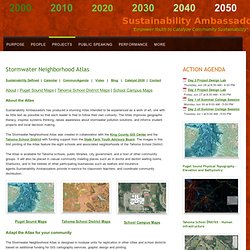
The Atlas improves geographic literacy, inspires systems thinking, raises awareness about stormwater pollution solutions, and informs student projects and local decision making. The Stormwater Neighborhood Atlas was created in collaboration with the King County GIS Center and the Tahoma School District with funding support from the State Farm Youth Advisory Board. The images in this first printing of the Atlas feature the eight schools and associated neighborhoods of the Tahoma School District. The Atlas is available for Tahoma schools, public libraries, city government, and a host of other community groups. LID Manual for Schools - Sustainability Ambassadors. LID Technical Assistance for Student Engineers Sustainability Ambassadors created the Stormwater Master Campus Planning Manual for schools as a curriculum-based engineering, science and policy guide for how to construct and maintain green infrastructure and other Low Impact Develop techniques on school property.
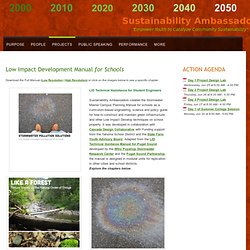
It was developed in collaboration with Cascade Design Collaborative with Funding support from the Tahoma School District and the State Farm Youth Advisory Board. Adapted from the LID Technical Guidance Manual for Puget Sound developed by the WSU Puyallup Stormwater Research Center and the Puget Sound Partnership, the manual is designed in modular units for replication in other cities and school districts. Explore the chapters below. Stormwater Curriculum Units - Sustainability Ambassadors. Tahoma School District - Sustainability Education Curriculum Units The Tahoma School District has developed stormwater related curriculum units at multiple grade levels.
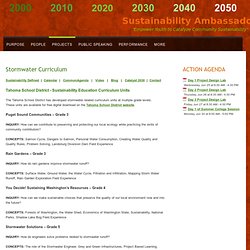
These units are available for free digital download on the Tahoma School District website. Puget Sound Communities – Grade 3 INQUIRY: How can we contribute to preserving and protecting our local ecology while practicing the skills of community contributors? CONCEPTS: Salmon Cycle, Dangers to Salmon, Personal Water Consumption, Creating Water Quality and Quality Rules, Problem Solving, Landsburg Diversion Dam Field Experience Rain Gardens – Grade 3.
Stormwater Videos - Sustainability Ambassadors. Landscape Investigation Guidelines - PEI. Field Investigation Guide - PEI. Project Based Learning - PEI. Sustainable Tomorrow Systems Thinking Guidebook - PEI. PBL for 21st Century Success. Project Based Learning - Buck Education Institute. Systems Thinking, Tools for a Systems Thinker - Waters Foundation. Inquiry Based Learning. What is inquiry-based learning?
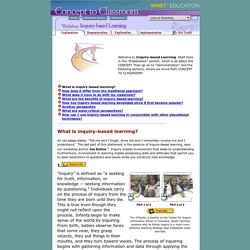
An old adage states: "Tell me and I forget, show me and I remember, involve me and I understand. " The last part of this statement is the essence of inquiry-based learning, says our workshop author Joe Exline 1. Inquiry implies involvement that leads to understanding. Furthermore, involvement in learning implies possessing skills and attitudes that permit you to seek resolutions to questions and issues while you construct new knowledge.
"Inquiry" is defined as "a seeking for truth, information, or knowledge -- seeking information by questioning. " A Context for Inquiry Unfortunately, our traditional educational system has worked in a way that discourages the natural process of inquiry. Some of the discouragement of our natural inquiry process may come from a lack of understanding about the deeper nature of inquiry-based learning. Importance of Inquiry Memorizing facts and information is not the most important skill in today's world. The Partnership for 21st Century Skills. Habits of Mind. Sustainable Project Design Manual - OSPI. What is sustainability?
Among the many ways that sustainability has been defined, the simplest and most fundamental is: "the ability to sustain" or, put another way, "the capacity to endure.
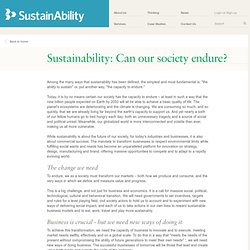
" Today, it is by no means certain our society has the capacity to endure – at least in such a way that the nine billion people expected on Earth by 2050 will all be able to achieve a basic quality of life. The planet's ecosystems are deteriorating and the climate is changing. We are consuming so much, and so quickly, that we are already living far beyond the earth's capacity to support us.
And yet nearly a sixth of our fellow humans go to bed hungry each day: both an unnecessary tragedy and a source of social and political unrest. Meanwhile, our globalized world is more interconnected and volatile than ever, making us all more vulnerable. While sustainability is about the future of our society, for today's industries and businesses, it is also about commercial success. The change we need What’s next Learn more about our work.